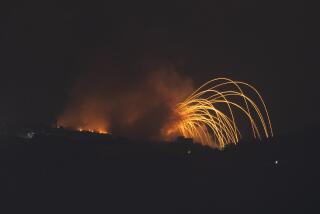U.N. Peacekeeping Force Providing a $20-Million Annual Windfall to the Lebanese
- Share via
TYRE, Lebanon — The United Nations peacekeeping force, which frequently comes under attack in southern Lebanon, is providing a windfall of $20 million a year to the 400,000 Lebanese it is here to protect.
Lebanon’s economy is a shambles. But business is booming in an area stretching from the Mediterranean in the west to Mt. Hermon in the east, where troops of the U.N. Interim Force in Lebanon (UNIFIL) are stationed.
“When we first deployed in the south in 1978, there were only 10,000 people in our area,” U.N. spokesman Timur Goksel said. “Now there are 400,000.
“Our logistics and administrative departments spent about $5 million on purchases in the last six months, paying for food and fuel, salaries for the 400 Lebanese employees, retainers for the 300 local contractors and miscellaneous expenses.”
5,800-Member Force
UNIFIL officials said members of the 5,800-member, nine-nation force spent $15 million more on personal purchases in the same six-month period.
UNIFIL’s estimated annual expenditure runs about $40 million, or 5.5% of Lebanon’s $716-million budget.
“In normal times, a soldier spends at least $10 a day,” Goksel said. “In rotation times, they spend enormously.” Rotation is when soldiers finish their tours, and they often buy up duty-free goods before going home.
“I spend more than half of my pay in Lebanon,” a French captain said. “I buy everything here--clothes, perfumes for my wife, electrical appliances and even French products, which are cheaper in Lebanon than they are at home.”
5 Dead in Attacks
UNIFIL is made up of units from France, Norway, Sweden, Italy, Ghana, Fiji, Nepal, Ireland and Finland. Five U.N. soldiers were killed and 44 wounded during August and September in a series of attacks. Lebanese security forces said radical Shia Muslim militiamen were responsible for most of the attacks.
Near UNIFIL’s headquarters at Naqoura, a southern Lebanese border town of about 1,500 people, 90 shops and restaurants have opened since the U.N. personnel moved in.
“There were only six shops when we first arrived,” Goksel said in an interview.
Business in Naqoura totally depends on UNIFIL, said Ismail Sabrawi, a news reporter in Tyre who opened a sporting goods shop after the peacekeepers came to the area.
90% Sales to Soldiers
“UNIFIL soldiers directly buy 40% of what I sell,” he said. “Naqoura merchants buy 50% and resell them to UNIFIL soldiers. Local customers account only for 10% of my business.”
In addition to sporting goods, Sabrawi sells a variety of items ranging from luggage and souvenirs to electrical appliances and cameras. He also said that troop-rotation time is the peak season.
“Soon before the rotation, they start buying bags, big bags, and they fill them up with whatever they can buy,” he said. “They can afford to buy lots of things. During the latest rotation they cleaned out my camera stand.”
Controls Minimal
Lebanese importers buy the goods abroad tax-free and unload them duty-free at illegal ports in Lebanon, where government controls are minimal because of the civil war.
In addition to paying no taxes or duties, the business have low overhead expenses because they are mostly family-owned. This permits them to sell foreign goods at prices that are lower than in their countries of origin.
Some Lebanese have formed what Goksel calls “flying donkey markets” to reach U.N. soldiers.
More to Read
Sign up for Essential California
The most important California stories and recommendations in your inbox every morning.
You may occasionally receive promotional content from the Los Angeles Times.












